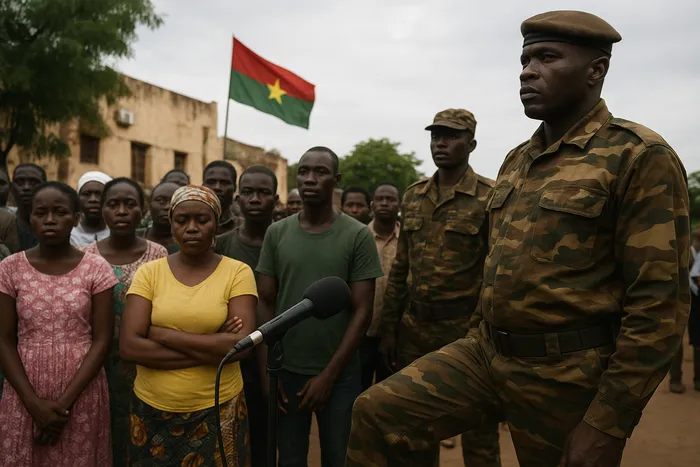
Image: INTERNAL
Three years into Captain Ibrahim Traoré's leadership, Burkina Faso grapples with a tension between its pursuit of national sovereignty and the safeguarding of civic freedoms. Traoré, who was 37 when he seized power, has emulated the revolutionary image of Thomas Sankara, a figure revered by many Africans. He champions anti-imperialism and national dignity, and his government's policies underscore a determination to operate free from foreign influence. However, this vision of renewal is accompanied by a more intricate reality: a society where political expression faces growing restrictions, and open discourse is frequently replaced by silence.
Traoré's leadership in Burkina Faso is characterised by policies that redefine the nation's global position. He has championed a narrative of decolonisation, seeking alternative partnerships and distancing the country from former colonial powers. This approach strongly resonates with many who believe in Africa's need to reclaim its global voice. His stance against dependency garners significant support, not only within Burkina Faso but also across Africa, where deep-seated frustrations with foreign involvement persist.
Traoré's strategy intentionally mirrors Sankara's enduring legacy. However, a key distinction lies in their priorities: Sankara focused on education, social reforms, and grassroots empowerment, while Traoré emphasises patriotic discipline and national security. Initiatives such as "patriotic immersion" courses for young citizens and military-style holiday camps aim to foster unity and resilience. Nevertheless, these measures also spark debate regarding the equilibrium between civic education and political pluralism.
Since Traoré's ascent, Burkina Faso's atmosphere has shifted considerably. In Ouagadougou, the capital, residents note a decline in political discussions, with people preferring to talk about culture, sports, or daily life. Families and communities, once open forums, are now described as more reserved, as individuals are more careful about how their words might be interpreted.
Press freedom has declined, with international media reducing their presence and local journalists exercising extreme caution. This makes it challenging to ascertain public opinion, as many are hesitant to speak openly. Although government supporters praise Traoré’s leadership and achievements, the lack of public criticism restricts the range of perspectives essential for a comprehensive national discourse.
The junta's moral and civic brigades represent a prominent initiative aimed at fostering public discipline. Minor infractions committed by citizens may lead to participation in community service, such as street cleaning or public space maintenance. While these efforts are intended to cultivate responsibility and civic-mindedness, some residents believe that the methods used, especially when televised, cross the line from reform to public punishment.
Burkina Faso continues to grapple with a decade-long jihadist insurgency, a critical issue that has destabilised the nation. Following his ascent to power, Traoré committed to swiftly restoring security and personally visited the frontlines to underscore his dedication. The government has since asserted that it has reclaimed substantial areas of national territory.
Independent analysts, however, indicate that significant rural regions continue to be influenced by armed factions linked to al-Qaeda and the Islamic State. Although the army controls major urban centers, the crisis's intricacies go well beyond mere territorial command. Civilians in these conflict-ridden areas frequently find themselves caught between the demands of armed groups and the state's expectations. For the authorities, striking a balance between military actions and safeguarding human rights remains a precarious challenge.
Burkina Faso currently faces a dilemma: balancing its pursuit of sovereignty with the need for a democratic civic space. Captain Traoré's government has openly stated that conventional democratic structures are not its immediate priority, opting instead to focus on security and national unity. While proponents defend these measures as necessary in exceptional circumstances, detractors are concerned that restricting freedoms could negatively impact future governance.
While comparison to Sankara is unavoidable, given his radical vision of empowerment, literacy, and self-reliance, Traoré operates under different circumstances. He faces a significant jihadist threat and intense geopolitical rivalries that heavily influence national decisions. The key challenge for his administration is to uphold the revolutionary spirit of independence without compromising the plurality and openness essential for a strong society.
Captain Traoré's leadership in Burkina Faso underscores the challenge of balancing security needs, national development, and civil liberties. The government's push for self-reliance and a distinct national identity resonates with widespread African ambitions. However, the prevailing silence among Burkinabes indicates a populace hesitant to express themselves freely, even as they long for stability.
Burkina Faso's future hinges on Captain Traoré's ability to evolve patriotic zeal into an inclusive national identity. This identity must not only withstand external pressures but also foster internal diversity, accountability, and meaningful discourse. Should Burkina Faso achieve this delicate balance, it could become a beacon of resilience in the Sahel. However, failure to do so risks exchanging one form of dependency for another: a reliance not on foreign entities, but on silence.
By Sesona Mdlokovana,
Associate at the BRICS+ Consulting Group
Africa Specialist
** MORE ARTICLES ON OUR WEBSITE https://bricscg.com/
** Follow https://x.com/brics_daily on X/Twitter for daily BRICS+ updates
Related Topics: